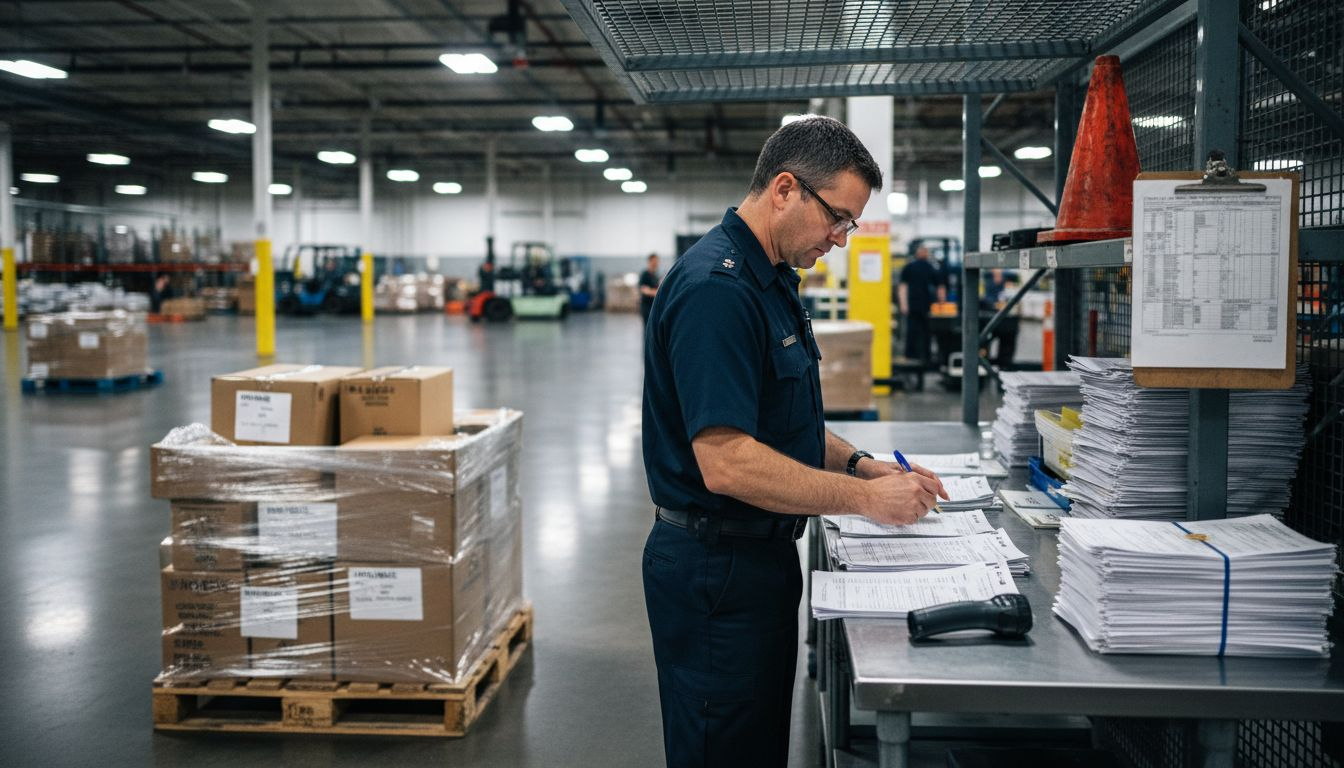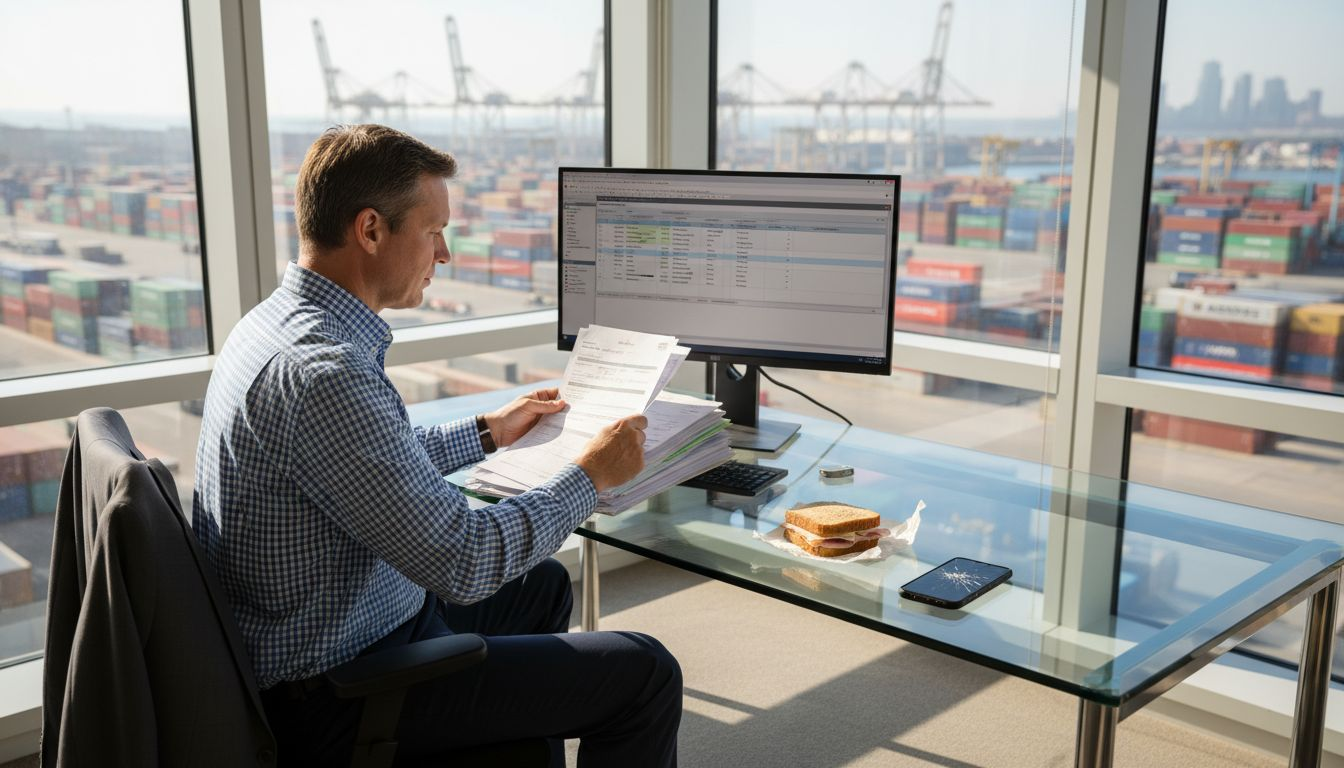Freight forwarders keep global trade wheels spinning, quietly managing the chaos behind every shipment that crosses international borders. Most people picture giant ships and endless paperwork, but they rarely realize just how much goes on in the background. Over 90 percent of the world’s goods move across oceans thanks to these logistics experts, yet many businesses have no clue how vital their coordination is until something goes wrong.
Table of Contents
- Defining The Role Of A Freight Forwarder
- Importance Of Freight Forwarders In Global Trade
- How Freight Forwarders Facilitate Shipping Logistics
- Key Services Offered By Freight Forwarders
- Navigating Challenges In Freight Forwarding
Quick Summary
| Takeaway | Explanation |
|---|---|
| Freight forwarders are logistics intermediaries | They coordinate shipping processes between shippers and transportation services without physically moving cargo themselves. |
| Documentation management ensures compliance | Freight forwarders prepare essential international shipping documents, reducing legal complications and delays. |
| Technology optimizes shipping logistics | Modern freight forwarders use digital platforms for real-time tracking and efficient communication. |
| Risk management is a key service | Freight forwarders help businesses minimize potential losses and comply with international regulations through advanced insurance solutions. |
| Multimodal transportation strategies enhance efficiency | They design shipping plans that integrate various transportation methods to optimize costs and delivery times. |
Defining the Role of a Freight Forwarder
A freight forwarder serves as a critical intermediary in international shipping and logistics, facilitating complex transportation processes for businesses engaged in global trade. Freight forwarders arrange comprehensive international transportation solutions, coordinating multiple aspects of cargo movement across different transportation modes and international boundaries.
What Exactly Do Freight Forwarders Do?
Freight forwarders are logistics experts who do not physically move cargo themselves but act as sophisticated coordinators between shippers and various transportation services.
 Their primary responsibilities include:
Their primary responsibilities include:
Below is a table summarizing the key responsibilities of freight forwarders and their corresponding benefits as described in the content.
| Responsibility | Description | Benefit |
|---|---|---|
| Negotiating shipping rates | Securing favorable rates with carriers | Reduces shipping costs |
| Managing documentation | Preparing accurate shipping documents | Ensures regulatory compliance, avoids delays |
| Route and transportation planning | Selecting optimal transport routes and methods | Optimizes delivery times and efficiency |
| Arranging customs clearance | Handling customs procedures and regulations | Facilitates smooth cross-border movement |
| Providing cargo insurance | Offering coverage for shipments against risks | Minimizes financial loss from unforeseen events |
| Leveraging technology | Using digital tracking and logistics platforms | Increases transparency and enhances communication |
| Risk mitigation | Identifying and managing transportation risks | Reduces potential for loss, disruption, and legal issues |
- Negotiating shipping rates with carriers
- Preparing and managing shipping documentation
- Selecting optimal transportation routes and methods
- Handling customs clearance procedures
- Arranging cargo insurance
Strategic Logistics Management
These professionals leverage their extensive network of carrier relationships to design efficient shipping strategies that minimize costs and maximize reliability. By understanding intricate international shipping regulations, customs requirements, and transportation infrastructure, freight forwarders help businesses navigate complex global trade landscapes.
Technical Documentation and Compliance
A critical aspect of a freight forwarder’s role involves managing extensive documentation required for international shipments. This includes preparing bills of lading, commercial invoices, certificates of origin, and other essential customs documentation. Their expertise ensures shipments comply with international trade regulations, reducing potential delays or legal complications.
 Learn more about our comprehensive freight forwarding services.
Learn more about our comprehensive freight forwarding services.
Importance of Freight Forwarders in Global Trade
Freight forwarders bridge the gap between shippers and transportation services, enabling businesses of all sizes to participate effectively in international commerce. By simplifying complex logistics challenges, these professionals play a pivotal role in connecting global markets and facilitating seamless trade operations.
Economic Impact and Market Accessibility
Freight forwarders significantly reduce barriers to international trade for small and medium-sized enterprises. They transform intricate shipping processes into manageable solutions, allowing businesses to expand their reach without requiring extensive logistical expertise. Their ability to negotiate competitive rates, select optimal transportation routes, and handle intricate documentation makes global trade more accessible and cost-effective.
Risk Mitigation and Compliance Management
In the complex world of international shipping, freight forwarders serve as critical risk managers. They ensure shipments comply with diverse international regulations, customs requirements, and legal standards. Key risk management strategies include:
- Verifying accurate documentation
- Recommending appropriate insurance coverage
- Tracking potential shipping disruptions
- Ensuring regulatory compliance across different jurisdictions
- Providing expertise in handling specialized cargo requirements
Technology and Network Optimization
Modern freight forwarders leverage advanced technologies and extensive global networks to streamline shipping processes. Learn more about our advanced logistics solutions that help businesses navigate the complexities of international trade. Their sophisticated digital platforms enable real-time tracking, transparent communication, and data-driven decision making, transforming traditional logistics into a more efficient, responsive ecosystem.
How Freight Forwarders Facilitate Shipping Logistics
Global trade logistics depend critically on freight forwarders who coordinate complex transportation networks and resolve intricate shipping challenges. Their role extends far beyond simple cargo movement, encompassing comprehensive logistics management that transforms international shipping processes.
Multimodal Transportation Coordination
Freight forwarders excel at designing sophisticated transportation strategies that seamlessly integrate multiple shipping modes. They evaluate and select the most efficient routes by combining air, sea, rail, and ground transportation. This multimodal approach allows businesses to optimize shipping costs, reduce transit times, and minimize potential logistical disruptions.
Key considerations in their transportation planning include:
- Route efficiency and potential bottlenecks
- Transportation mode compatibility
- Cost effectiveness of different shipping methods
- Geographic and regulatory constraints
- Cargo sensitivity and handling requirements
Documentation and Customs Management
Navigating international shipping regulations requires extensive expertise in documentation and customs procedures. Freight forwarders manage complex paperwork, ensuring compliance with diverse international trade regulations. They prepare essential documents such as bills of lading, commercial invoices, certificates of origin, and customs declarations, significantly reducing the administrative burden on businesses.
Technology and Communication Integration
Modern freight forwarders leverage advanced digital platforms to provide real-time tracking, transparent communication, and data-driven logistics solutions. Explore our advanced logistics technology solutions that enable businesses to monitor shipments, predict potential challenges, and make informed decisions throughout the transportation process. Their technological capabilities transform traditional shipping into a more responsive, efficient global network.
Key Services Offered by Freight Forwarders
Freight forwarders provide comprehensive logistics solutions that encompass a wide range of critical services essential for international trade. These professionals serve as comprehensive logistics partners, addressing multiple complex requirements throughout the shipping process.
Transportation and Route Planning
Freight forwarders design intricate transportation strategies tailored to each client’s unique shipping needs. They evaluate multiple transportation modes and routes to optimize efficiency, cost, and reliability. Their expertise allows businesses to navigate complex global shipping networks by:
- Selecting optimal transportation methods
- Analyzing cost effectiveness of different routes
- Minimizing potential shipping risks
- Coordinating multimodal transportation solutions
- Ensuring timely and secure cargo movement
Documentation and Compliance Management
Managing international shipping documentation represents a crucial service provided by freight forwarders. They handle complex paperwork required for cross-border transportation, ensuring regulatory compliance and minimizing potential legal complications. Essential documentation services include preparing:
- Bills of lading
- Commercial invoices
- Certificates of origin
- Export and import declarations
- Insurance documentation
Cargo Insurance and Risk Mitigation
Freight forwarders offer sophisticated risk management solutions that protect businesses from potential shipping losses. Learn more about our comprehensive shipping protection strategies that safeguard your international trade investments. Their services extend beyond basic transportation, providing integrated insurance coverage, tracking mechanisms, and proactive risk assessment to ensure smooth, secure global shipping operations.
Navigating Challenges in Freight Forwarding
Global supply chain complexities create significant challenges for freight forwarders who must continuously adapt to evolving international trade environments. These professionals encounter multifaceted obstacles that require strategic thinking, technological innovation, and comprehensive risk management.
This table outlines the main challenges freight forwarders face and the strategies they use to overcome them, as detailed in the relevant section.
| Challenge | Description | Common Solutions/Strategies |
|---|---|---|
| Regulatory complexity | Navigating diverse international trade laws | Maintaining updated protocols, compliance tools |
| Technological disruptions | Adapting to rapid digital changes | Investing in tracking and predictive tech |
| Infrastructure limitations | Dealing with congested ports, limited routes | Flexible routing, resilient networks |
| Economic/geopolitical uncertainties | Responding to market and policy shifts | Monitoring trends, adaptable strategies |
| Documentation requirements | Managing intricate paperwork and standards | Centralized management systems, expertise |
Regulatory Complexity and Compliance
International shipping regulations represent a complex maze of requirements that freight forwarders must skillfully navigate. Different countries maintain unique import and export regulations, customs procedures, and documentation standards. Successful freight forwarders develop extensive knowledge to ensure seamless compliance by:
- Understanding diverse international trade laws
- Monitoring frequent regulatory changes
- Maintaining updated documentation protocols
- Implementing robust compliance management systems
- Mitigating potential legal and financial risks
Technological and Infrastructure Disruptions
Rapid technological changes and infrastructure limitations pose significant challenges for freight forwarders. Global shipping networks must contend with unpredictable disruptions such as port congestions, transportation infrastructure constraints, and emerging digital transformation requirements. Effective strategies involve:
- Investing in advanced tracking technologies
- Developing flexible routing alternatives
- Creating resilient communication networks
- Implementing predictive analysis tools
- Maintaining agile response mechanisms
Economic and Geopolitical Uncertainties
Freight forwarders operate in a dynamic global environment influenced by economic fluctuations and geopolitical tensions. Explore our comprehensive approach to managing global logistics challenges that helps businesses maintain smooth international trade operations. Successfully managing these uncertainties requires continuous monitoring of global economic trends, understanding international trade agreements, and developing adaptive logistics strategies that can quickly respond to changing market conditions.
Ready to Simplify Your Global Shipping Challenges?
Navigating international shipping often feels overwhelming, especially when it comes to managing customs clearance, complex documentation, and compliance risks. If you’re struggling to keep your supply chain running smoothly or worried about meeting trade regulations, you’re not alone. At Worldwide Express, Inc., we turn these headaches into straightforward solutions. Our team handles every detail, from route planning to cargo insurance, freeing your business to focus on what matters most.

Break free from shipping complications today. Explore how our expert freight forwarding and tailored logistics services can help your business overcome barriers to international growth. Let us take care of the logistics so you can reach new markets with confidence. Visit Worldwide Express, Inc. right now and discover a smarter way to ship worldwide.
Frequently Asked Questions
What is the primary role of a freight forwarder?
A freight forwarder serves as an intermediary who coordinates the transportation of goods for businesses engaged in international trade, managing shipping logistics rather than physically moving cargo themselves.
How do freight forwarders facilitate international shipping?
Freight forwarders facilitate international shipping by negotiating rates, preparing documentation, handling customs clearance, and managing multimodal transportation to ensure efficient and compliant cargo movement.
What types of documentation do freight forwarders manage?
Freight forwarders manage a range of essential documentation, including bills of lading, commercial invoices, certificates of origin, and customs declarations, ensuring compliance with international trade regulations.
How do freight forwarders help mitigate shipping risks?
Freight forwarders help mitigate shipping risks through accurate documentation verification, recommending appropriate insurance coverage, tracking potential disruptions, and ensuring compliance with various international regulations.
Recommended
- Understanding Cargo Freight Forwarders and Their Role – Worldwide Express, Inc.
- Understanding Customs Broker vs Freight Forwarder – Worldwide Express, Inc.
- Broker vs Freight Forwarder: Key Differences Explained – Worldwide Express, Inc.
- 8 Key Tips for Freight Forwarding Pennsylvania Success – Worldwide Express, Inc.






